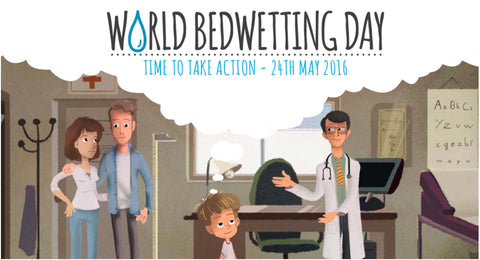
Rhia Favero talks to us about World Bedwetting Day – 24th May
“World Bedwetting Day is about raising awareness of bedwetting as a common treatable condition. There are lots of children and families going through it and we want them to know there are many treatments available. They don’t have to suffer on their own”.
We talked to Rhia Favero, the Communications and Campaign Manager for ERIC, The Children’s Bowel and Bladder Charity promoting World Bedwetting Day in the UK. Despite it being a very common condition (it affects about 15.5% of 7 year olds, 9.5% of 9 year and 1-2% of teenagers) it is often misunderstood.

WHAT IS WORLD BEDWETTING DAY ABOUT?
2016 will see World Bedwetting Day in its second year. It’s an initiative led by the International Children’s Continence Society (ICCS) and the European Society of Paediatrics Urology (ESPU), which is backed by the pharmaceutical company Ferring. Originally held in October, and now held in May, the aim is to help families prepare for the coming summer months. This helps parents plan for summer activities.
WHAT CAUSES BEDWETTING IN CHILDREN?
Bedwetting is unfortunately often seen as a problem with the child. More often than not, however, it’s beyond the child’s control. It occurs when a child is sleeping and the child has no conscious control over it.
Common causes include:
- Over production of urine at night. The hormone Vasopressin has many functions and one of them is to regulate the production of urine at night. In some children this hormone doesn’t kick in until they are older, and they produce too much wee at night.
- Constipation. Often ignored, a child may be suffering constipation where the full bowel squashes the bladder, reducing its size. The bladder cannot hold on to the urine that’s produced and the child wets.
- Small bladder. When a child wets their bed at night, a parent’s first reaction is to reduce the intake of liquids. This actually has a negative impact on the child’s bladder. By reducing the intake of liquids, the bladder does not have the chance to expand, thereby denying the child the chance to train their bladder to stretch to its full capacity during the day and be able to hold lots of wee throughout the night.
- Over-active bladder. This is when the muscles of the bladder constantly twitch, meaning that wee will come out. Medication is required to relax the bladder in such cases.
STIGMA AROUND BEDWETTING
The aim of World Bedwetting Day is to get parents to talk about it as it is still rarely discussed. When families realise that the condition is more common than initially thought, it is hoped that parents will turn to advice from practitioners to help their child.
“Poo is harder to talk about than wee, but people are more willing to open up about constipation and soiling than bedwetting. The image that bedwetting revolves around is it being the child’s fault or the child is doing something wrong and should be punished. This is a perception that we need to change.”
Children aged between 4-6 years old are often seen as having just come out of nappies and are hence forgiven. It’s when the child is older where outings are involved such as sleepovers and camping that it’s seen as a problem, and when the child starts to recognise it as a problem and want to stop. Fear of being ‘found out’ can cause anxiety in both the parents and the child. Sometimes when a child’s secret is discovered it can lead to bullying and, as a result, low self-esteem and isolation.
“We see a lot of fear from parents of the child being found out which propagates the thought that it’s the child’s fault. If it’s not treated in the early years, the child becomes introverted and avoids social interaction and outings such as camping and sleepovers.”
Rhia then explains how this “becomes a viscous cycle, where the child purposely isolates themselves and then other kids think they’re different for not participating. They might struggle to make friends, become more self-conscious, and their self-esteem is affected”.
LONG TERM EFFECTS IF UNTREATED
Bedwetting runs in families; if a child has one parent who wet the bed, there is a 40% chance the child will too. If two parents wet the bed, the chance rises to 70%.
Bedwetting can also affect teenagers’ willingness to enter into relationships. “Some people will enter relationships where a partner is very understanding, others will avoid relationships altogether because of fear”, says Rhia.
A child who wets their bed can have a massive impact on families with various consequences. The endless sleepless nights caused by the bed wetting alarm going off and the constant washing of bed sheets and pyjamas is not only costly, but taxing on the parents, especially the one who has to do deal with it daily.
Rhia advises that picking up the child in the middle of the night is ineffective as the child becomes dependent on the parent lifting them. The child needs to learn to get out of bed themselves or hold onto the wee.
SPREADING THE WORD ABOUT WORLD BEDWETTING DAY
With an estimated half a million children in the UK alone aged between 5 and 16 regularly wetting the bed, the World Bedwetting Day campaign hopes to educate parents that it is a common and treatable condition. It looks to engage families that ordinarily would not have sought support in the past and get the help they need. It does this by sending out pamphlets and resources to local continence nurses, school nurses and schools. While there are challenges in reaching the full population of sufferers due to cultural and language barriers, the previous campaign saw a significant increase in parents responding to the campaign. Rhia hopes to see teachers also educated on the subject so they can teach children in the classroom.

ADVICE TO PARENTS WITH A BEDWETTING CHILD
When asked what 4 tips she would give to a parent who has a child that wets the bed, here is what Rhia suggests:
- Speak to your GP or school nurse
- Call ERIC on their helpline 0845 370 8008 or email on helpline@eric.or.uk
- Download theERIC's guide to night time wetting to find out why bedwetting happens, what can be done to stop it and how it can be managed.
- Go to ERIC’s Message Board and speak (anonymously) to other people going through the same thing or follow what others are talking about.
You can also raise awareness of bedwetting and its treatment through supporting ThunderClap - 100 people need to back it to make it happen!!!
USEFUL LINKS
- World Bedwetting Day website
- ERIC’s website
- ERIC Facebook Group
- Eric Twitter Page
- ERIC Helpline Number: 0845 370 8008

